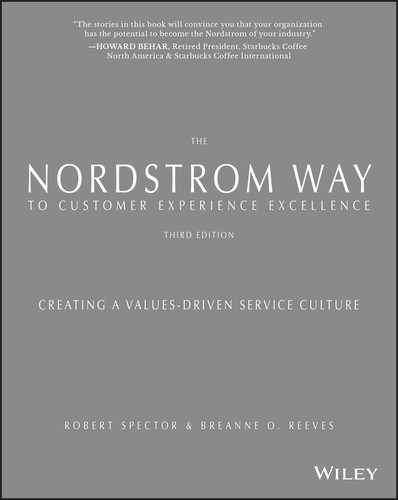Foreword
As a Seattle native, I've had a front‐row seat to Nordstrom's growth from our little corner of the world to 39 states, three Canadian provinces, and one commonwealth, while earning an international reputation (with online customers in almost 100 countries!) for providing the gold standard in customer service experience.
I've had the pleasure of knowing several members of the Nordstrom family and I've expressed to them my admiration for how they conduct their business. Nordstrom, like Starbucks, exemplifies our Northwest values that combine competitiveness with caring.
In our hypercompetitive, ever‐changing, ever‐challenging retail world, where concepts come and go and where competitors rise and fall, how has Nordstrom been able to survive and thrive for almost 120 years? Robert Spector and breAnne O. Reeves provide the simple answers to this existential question.
As the subtitle indicates, this is a book about creating a values‐driven, service‐obsessed corporate culture that encourages, motivates, rewards, recognizes, and compensates employees to consistently deliver a world‐class experience to customers, one customer at a time.
As the world economy becomes more and more about relationships and connections that are built on the foundation of trust and respect, Nordstrom's principles of personal leadership are more important and relevant than ever.
At Starbucks, we believe what Nordstrom believes: The employee experience determines the customer experience. If you regard employees and customers as human beings, everything else will take care of itself. It's an article of faith that if you engage your staff as partners (not assets or labor costs), they will achieve results beyond what is thought possible.
Through four generations of family leadership, the Nordstroms have shown that they know who they are, and that they know the kind of people they want to attract to their team. The Nordstroms bring clarity and honesty in regard to who they are, where they want to go, and how they're going to get there. They are clear about their purpose, values, and goals, and they draw people who are aligned (both individually and collectively) with the very same purpose, values, and goals.
Culture is a funny thing. Changing it is not about talking about it; it's about living it. People will rise or fall to the expectations that the organizational culture puts on them. If cultural expectations are high, the chances are good that they will be met. Conversely, if expectations are low, those expectations will also be met.
Nordstrom believes in doing the right thing. The company seeks out people who want to do all the right things for all the right reasons. They seek out individuals who can think independently and who make the goal of creating a satisfied customer their highest priority. Nordstrom believes in throwing out the rules—real and imagined—and promoting empowerment and autonomous thinking. This philosophy is epitomized in their only rule: “Use Good Judgment in All Situations.”
In many cases, in most organizations, the rulebook goes way too far. It tries to tell people how to be instead of explaining what they're trying to do. At Starbucks, we always said that we need “recipes, not rules.”
Again, clarity of purpose is essential. Nordstrom is clear that every decision the company makes is for the benefit of customers, and that Nordstrom employees—both on the frontlines and in support—are crucial to enhancing the customer experience.
Trust is the cornerstone of all human interaction, be it social, emotional, or commercial. Caring—for coworkers and customers—is a sign of strength. Without trust and caring we'll never know what could have been possible in our organization.
High‐trust companies hold their people accountable, treat them like responsible adults, and encourage them to take ownership of the customer experience. They want their people to be true to themselves and to their values. Positive actions and decisions build trust and show that you care. The best Nordstrom sales associates will do virtually everything he or she can to make sure a shopper leaves the store a satisfied customer. As my friend Bruce Nordstrom says, “The happiest customer is the one who leaves the store carrying a Nordstrom shopping bag.”
“Servant Leadership” is a philosophy and set of practices that I have tried to adhere to—from the days of watching my parents running their small grocery store in Seattle, to all my years at Starbucks, to the life I live today as an author, speaker, and mentor. The Nordstrom family and every successful Nordstrom manager, buyer, and executive represent the ideal of servant leadership. We are here to serve and support our team, not the other way around.
At Starbucks, we believe that there is no conflict between treating your people with respect and dignity and making a profit. We simply stated that respect and dignity are essential, which is why respect and dignity were factored into the price of every cup of coffee we sold.
Robert and breAnne have identified core cultural values that are absolute necessities for every organization: trust, respect, loyalty, awareness, humility, communication and collaboration, competition and compensation, innovation and adaptation, and give back and have fun. We can all agree that these values are essential to loyalty and longevity.
In this compelling and entertaining book, Robert Spector and breAnne O. Reeves show how any organization—including yours—can create a lasting customer service culture by attracting people who buy into your nonnegotiable core values.
Chock‐full of stories of exemplary customer service, unselfish teamwork, fearless innovation, community and global citizenship, and good old‐fashioned fun, this book will make you laugh, shed a tear or two, and convince you that your organization has the potential to become the “Nordstrom” of your industry.
If that's your goal, what better time to start than right now?
HOWARD BEHAR, retired president,
Starbucks North America and Starbucks International
